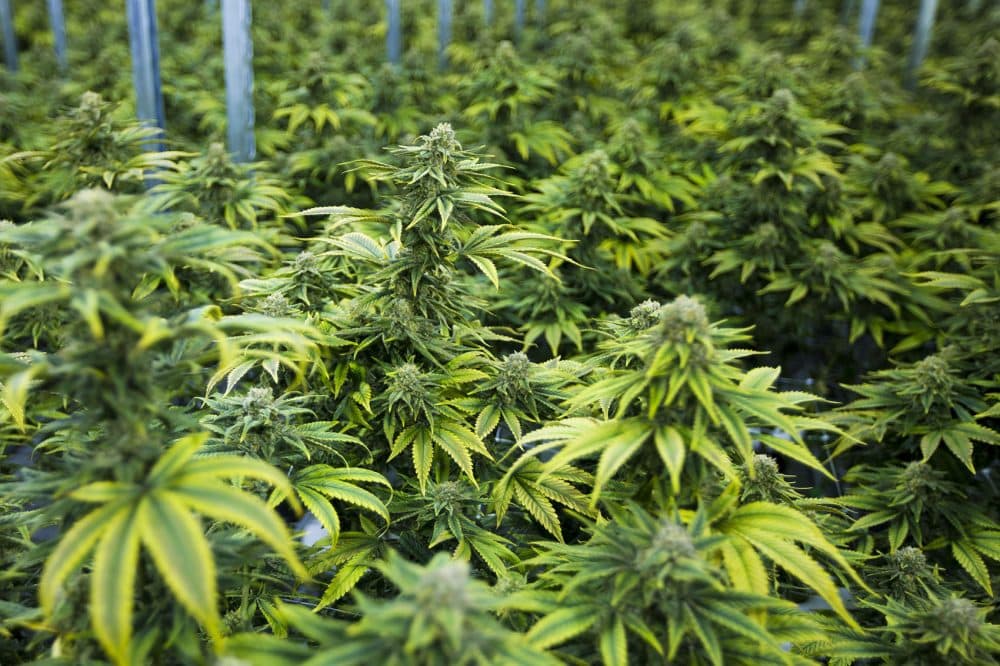Advertisement
With 1 Month To Go, Is Canada Ready For Legal Recreational Marijuana?
Resume
Canada is one month out from a major milestone: The country is set to legalize recreational marijuana on Oct. 17.
Here & Now's Peter O'Dowd talks with former Deputy Prime Minister Anne McLellan (@DalChancellor), who helped lay the groundwork for legalization and regulation, about how the process is going to work and whether Canada is ready.
Interview Highlights
On whether she believes Canada is ready for cannabis legalization
"Well, I guess it depends who you talk to. There are those who would suggest that we are not ready, but I think it's relative, and I do believe that the government of Canada is ready.
"We have had in place — actually under our medicinal regime — license producers. The government of Canada knows how to license producers, license manufacturers of product. The government of Canada has put in place the marketing, the advertising regulatory regime, the quality control regime around production and manufacturing. So, I think it's pretty clear the federal government probably is in a generally good place."
On how regulations will differ from province to province and municipality to municipality
"I think where you start to see concerns being raised is in relation to the variation among the provinces and territories. The government of Canada only has jurisdiction over production and manufacturing, and in fact, wholesaling of product, the retail market — which of course so many people are focused on and speculating about — is within provincial and municipal jurisdiction.
"We anticipated the fact that there would be provincial variation and municipal variation, and in fact, provinces will learn from each other, municipalities will learn from each other."
"It's really important to get out and educate your public — especially your youth — early and to keep educating."
Anne McLellan
On how the federal government will use tax revenues generated by cannabis sales, and how much revenue is estimated to be generated
"Those revenues, at least in the early years, that come to the government of Canada, will be used for further research for addiction treatment, for mental health resources and treatment, and for public education, because we all agree, and we heard when we visited states in the U.S. that have legalized [cannabis], it's really important to get out and educate your public — especially your youth — early and to keep educating.
"I am not going to speculate as to what the revenues might look like. People are still looking at estimates in terms of in the early years what usage rates might look like. You know, anywhere from 650,000 tons of product. Now, people are talking about the fact it might be as much as 900,000 tons of product on an annual basis, so obviously the usage rates and the price will determine the taxes paid, both excise taxes and sales taxes."
On the concern that because of cannabis legalization, more people will drive high
"Keep in mind, drug-impaired driving is a problem right now. The problem is not going to magically appear for the first time for law enforcement on Oct. 17. But, having said that, absolutely, we as a task force heard a lot of concerns about drug-impaired driving, cannabis-impaired driving, and how you detect impairment, because, of course, cannabis does not metabolize in the body the way alcohol does.
"But people should also remember that we've had 40, 50 years worth of experimentation to get to the point where we are today with alcohol, in terms of having a roadside breathalyzer test that stands up in court. No question that there's a lot of research being done around trying to develop better tests, but I can assure you, police have tools now. They have the standard sobriety test, which is well known for alcohol and also for drugs, and the government of Canada has approved an oral saliva test that officers will be provided with and they will be trained on.
"But nobody should underestimate the fact that this is a legitimate concern just as it is right now."
On her belief that cannabis use will increase among the baby-boom generation
"I actually believe that you're going to see the growth in cannabis usage with my generation, with the boomer generation, for pain, for spasticity, going through cancer treatment. So, I actually predict that 10 years out, your growth may be with an older part of the Canadian population."
"I think these two countries have been through a lot together, and we will continue to work together and be respectful and be each other's best friends."
Anne McLellan
On whether she believes the tense relationship between Canada and the U.S. over trade will last
"No, I don't think so. There is no question that this is a difficult period of time. I think you can't believe all the headlines, at least in relation to NAFTA. I think Canadian negotiators — including the Minister [of Foreign Affairs] Chrystia Freeland — [are] working very hard on trying to get a good deal for all three countries.
"I also remind people that Congress has an important role to play here. I don't think people should get too wrapped up in following various people's Twitter feeds by, you know, the day or the hour.
"I think these two countries have been through a lot together, and we will continue to work together and be respectful and be each other's best friends."
This segment aired on September 17, 2018.